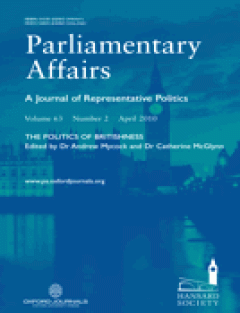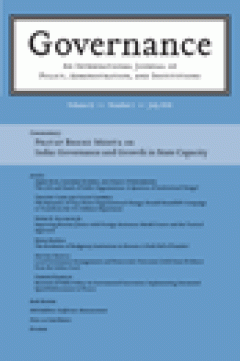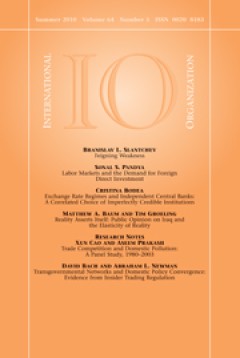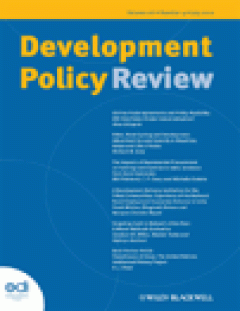Filter by

Reform of the Wash-up: Managing the Legislative Tidal Wave at the End of a Pa…
In the few days between the calling of a general election and the dissolution of the Westminster Parliament, outstanding legislation is expedited through the Commons and Lords on the basis of deals made privately between the government and main opposition party. This process, known as the wash-up, has been criticised for restricting parliamentary scrutiny and marginalising backbenchers, crossbe…
- Edition
- Vol. 63 No. 3 July 2010. pp. 558-569
- ISBN/ISSN
- 00312290
- Collation
- -
- Series Title
- Parliamentary Affairs
- Call Number
- -

India: Governance and Growth in State Capacity
- Edition
- Volume 23, Issue 3, July 2010. pages 381–384
- ISBN/ISSN
- 14680491
- Collation
- -
- Series Title
- Governance
- Call Number
- -
- Edition
- Volume 23, Issue 3, July 2010. pages 381–384
- ISBN/ISSN
- 14680491
- Collation
- -
- Series Title
- Governance
- Call Number
- -

The Life and Death of Public Organizations: A Question of Institutional Design?
Why do some public organizations grow old and others die young? Since Herbert Kaufman first posed this question, considerable research has been devoted to answering it. The findings of that research suggest that the design of new public organizations affects, to a significant degree, their survival chances. In this article, we test whether and how �design factors� affected the durability of the…
- Edition
- Volume 23, Issue 3, July 2010, pages 385–410
- ISBN/ISSN
- 14680491
- Collation
- -
- Series Title
- Governance
- Call Number
- -

The Dynamics of Top-Down Organizational Change: Donald Rumsfeld's Campaign to…
Drawing upon interviews with 69 defense policymakers and close observers, this article develops an extrapolation-oriented case study of Donald Rumsfeld's campaign to transform the development of the U.S. Defense Department's future capabilities. This reform effort, launched by President George W. Bush during his first presidential campaign, encountered difficulties in developing and promoting t…
- Edition
- Volume 23, Issue 3, pages 411–435, July 2010
- ISBN/ISSN
- 09521895
- Collation
- -
- Series Title
- Governance
- Call Number
- -

Improving Russian Justice with Foreign Assistance: Model Courts and the Tacti…
This article argues that as an interactive, tactical approach to sharing good practices, model courts represent an especially fruitful vehicle for accomplishing judicial reform. This contention is illustrated with an assessment of Canadian and American judicial reform projects in Russia in creating model district courts and diffusing their experience to other courts throughout the country. Mech…
- Edition
- Volume 23, Issue 3, pages 437–462, July 2010
- ISBN/ISSN
- 09521895
- Collation
- -
- Series Title
- Governance
- Call Number
- -

The Evolution of Budgetary Institutions in Estonia: A Path Full of Puzzles?
This article examines the evolution of budgetary institutions in Estonia between 1993 and 2008, with a main focus on rules governing the preparation, adoption, and implementation of the state budget. It discusses the initial choice of budgetary institutions in 1993 and subsequent developments in the light of theoretical propositions put forth by the fiscal governance literature. The case of Est…
- Edition
- Volume 23, Issue 3, July 2010. pages 463–484
- ISBN/ISSN
- 09521895
- Collation
- -
- Series Title
- Governance
- Call Number
- -

Local Governance Arrangements and Democratic Outcomes (with Some Evidence fro…
This article carries a broad definition of public�private concertation as a flexible form of governance that is able to overcome the distinction between network governance and participatory governance. It creates a unified framework relying on a process-related democratic approach in order to properly assess these practices in their democratic outcomes. This allows the article to fully depict h…
- Edition
- Volume 23, Issue 3, July 2010, pages 485–508
- ISBN/ISSN
- 09521895
- Collation
- -
- Series Title
- Governance
- Call Number
- -

Renewal of Public Policy via Instrumental Innovation: Implementing Automated …
This article examines the renewal of public policy via instrumental innovation since the adoption in France of an automated sequence of detection and sanctioning of speed limit violations. Involved here is an instrument of public policy that points up the changes that have taken place in recent years in respect of road safety policy and provides a clearer view of some aspects of ongoing state r…
- Edition
- Volume 23, Issue 3, July 2010. pages 509–530
- ISBN/ISSN
- 09521895
- Collation
- -
- Series Title
- Governance
- Call Number
- -

Emotional Beliefs
A belief in alien abduction is an emotional belief, but so is a belief that Iran intends to build nuclear weapons, that one's country is good, that a sales tax is unjust, or that French decision makers are irresolute. Revolutionary research in the brain sciences has overturned conventional views of the relationship between emotion, rationality, and beliefs. Because rationality depends on emotio…
- Edition
- Vol. 64 No. 1 January 2010.pp. 1-31
- ISBN/ISSN
- 00208183
- Collation
- -
- Series Title
- International Organization
- Call Number
- -

Nonstate Actors and the Diffusion of Innovations: The Case of Suicide Terrorism
Studies of terrorism in general and suicide terrorism in particular tend to view terrorist groups independently. However, what if the propensity for a terrorist group to adopt suicide tactics depends in part on its external linkages and the relationship between the organizational capabilities required to adopt the innovation and the organizational capabilities of the group? This article shows t…
- Edition
- Vol. 64 No. 1 January 2010. pp. 33-64
- ISBN/ISSN
- 00208183
- Collation
- -
- Series Title
- International Organization
- Call Number
- -

Constraining Coercion? Legitimacy and Its Role in U.S. Trade Policy, 1975–2000
The role of legitimacy in international relations is a topic of much debate, yet there is little understanding of the mechanism behind it. Here I address this discrepancy by asking: are state threats perceived as (il)legitimate more or less likely to be successful? By operationalizing illegitimacy as unilateral action in the presence of a multilateral option, I consider the variation in the suc…
- Edition
- Vol. 64 No. 1, January 2010.pp. 65-96
- ISBN/ISSN
- 00208183
- Collation
- -
- Series Title
- International Organization
- Call Number
- -

Toward Internationally Regulated Goods: Controlling the Trade in Small Arms a…
Contrary to the general trend of trade liberalization, specific goods�such as small arms, drugs, and antiquities�have come under increasing international control in recent decades through a set of international regulatory agreements. This article offers a theoretical framework of government preferences on the international regulation of these goods. Departing from conventional models of trade p…
- Edition
- Vol. 64 January 2010 January 2010.pp. 97-131
- ISBN/ISSN
- 00208183
- Collation
- -
- Series Title
- International Organization
- Call Number
- -

How Opportunity Costs Decrease the Probability of War in an Incomplete Inform…
This article shows that the opportunity costs resulting from economic interdependence decrease the probability of war in an incomplete information game. This result is strongly consistent with existing empirical analyses of the inverse trade-conflict relationship but is the opposite of the conclusion reached by Gartzke, Li, and Boehmer, who reject the opportunity cost argument in a game-theoret…
- Edition
- Vol. 64 No. 1 January 2010.pp. 133-144
- ISBN/ISSN
- 00208183
- Collation
- -
- Series Title
- International Organization
- Call Number
- -

Spatial Effects in Dyadic Data
Political units often spatially depend in their policy choices on other units. This also holds in dyadic settings where, as in much of international relations research, analysis focuses on the interaction or relation between a pair or dyad of two political units. Yet, with few exceptions, social scientists have analyzed contagion in monadic datasets only, consisting of individual political unit…
- Edition
- Vol. 64 No. 1 January 2010.pp. 145-166
- ISBN/ISSN
- 00208183
- Collation
- -
- Series Title
- International Organization
- Call Number
- -

Do Democracies Make Inferior Counterinsurgents? Reassessing Democracy's Impac…
A core proposition from decades of research on internal wars asserts that democracies, with their casualty-averse publics, accountable leaders, and free media, are uniquely prone to losing counterinsurgency (COIN) wars. Yet one should question this finding, for two reasons. First, existing studies overwhelmingly adopt no-variance research designs that only examine democracies, leaving them unab…
- Edition
- Vol. 64 No. 1 January 2010.pp. 167-192
- ISBN/ISSN
- 00208183
- Collation
- -
- Series Title
- International Organization
- Call Number
- -

Policy Experiments, Democratic Ownership and Development Assistance
In an effort to enhance the impact of development aid, recipients are called on to provide democratically sustained �ownership� for development policies, and donors to align their interventions with these ownership-dictated strategies of their partners. This article illustrates the weaknesses of such an approach. From a political-economy perspective, severe tensions exist between concepts of de…
- Edition
- Volume 28, Issue 5, September 2010, pages 515–534
- ISBN/ISSN
- 09506764
- Collation
- -
- Series Title
- Development Policy Review
- Call Number
- -

Eastern Donors and Western Soft Law: Towards a DAC Donor Peer Review of China…
The international system is still governed by a normative framework designed mainly by OECD countries, especially with regard to soft-law standards in the field of development co-operation. However, the growing relevance of �Eastern donors� is weakening its efficiency and raises the question of how compliance with these standards can be assured in a changing donor landscape. Despite efforts to …
- Edition
- Volume 28, Issue 5, September 2010. pages 535–552
- ISBN/ISSN
- 09506764
- Collation
- -
- Series Title
- Development Policy Review
- Call Number
- -

Revenue Mobilisation in Sub-Saharan Africa: Challenges from Globalisation I �…
This is the first of two articles evaluating the nature and extent of, and possible responses to, two of the central challenges that globalisation poses for revenue mobilisation in sub-Saharan Africa: trade liberalisation, and corporate tax competition. Both articles use a new dataset with the features needed to address these issues meaningfully: a disentangling of tariff from commodity tax rev…
- Edition
- Volume 28, Issue 5, September 2010. pages 553–571
- ISBN/ISSN
- 09506764
- Collation
- -
- Series Title
- Development Policy Review
- Call Number
- -

Revenue Mobilisation in Sub-Saharan Africa: Challenges from Globalisation II …
This second article evaluates and discusses the challenges to government revenue in sub-Saharan Africa posed by developments in corporate taxation. Using the dataset described in the first article, it shows that, in broad terms, corporate tax revenues in the region have held up, despite a reduction in rates and evidence of substantial base-narrowing (mainly through the provision of tax holidays…
- Edition
- Volume 28, Issue 5, September 2010. pages 573–596
- ISBN/ISSN
- 09506764
- Collation
- -
- Series Title
- Development Policy Review
- Call Number
- -

Linking State and Non-State Security and Justice
Until recently links between state and non-state security and justice have been given scant attention, despite being an important part of safety and security provision in the South. This article examines the circumstances in which such linkages occur; the benefits enjoyed by the partners; and the problems encountered. It considers how their success is to be measured, and how and when they can b…
- Edition
- Volume 28, Issue 5, September 2010. pages 597–616
- ISBN/ISSN
- 09506764
- Collation
- -
- Series Title
- Development Policy Review
- Call Number
- -
 Computer Science, Information & General Works
Computer Science, Information & General Works  Philosophy & Psychology
Philosophy & Psychology  Religion
Religion  Social Sciences
Social Sciences  Language
Language  Pure Science
Pure Science  Applied Sciences
Applied Sciences  Art & Recreation
Art & Recreation  Literature
Literature  History & Geography
History & Geography